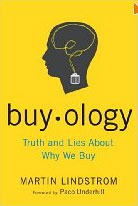Buyology
 |
Author: Martin Lindstrom |
I really enjoy this kind of book. Why? Because I think some of the sharpest psychological observations come from studying the bottom line. Just think about the groundbreaking book based around why we spend money on what we do: Influence: The psychology of persuasion by Robert Cialdini which uses understandings of market research (as well as wider psychological study) to shed light on every day behavior in you and me. See our review.
Martin Lindstrom is an international marketing expert and gets paid millions to advise marketers on how to best appeal to the unconscious drives of their (potential) customers. Although he can count some of the biggest industry leaders among his clients, he refuses to work for the tobacco industry on ethical grounds. Buyology has some interesting things to say about why government anti-smoking campaigns, designed to scare people away from the toxic weed, actually stimulate the same areas of the brain that produce the craving to smoke! Using MRI scans of the brain, we get to look at psychology on the neurological level as well as on the behavioral level.
We all talk about consumerism being the 'new religion' and Lindstrom takes this a stage further by showing that, neurologically, people respond to 'brand' products in much the same way as people respond to religion. This is an astonishing insight. Consumerism may be destroying religion - but only the type of religion that can be replaced by consumerism.
This doesn't necessarily mean that religion is really nothing more than a combination of hope and fear (the two emotions that strongly drive consumerism), but that religion can be consumerist when we are 'doing it wrong'. So we can be 'materialistic' about the way we approach religion and the materialism here is about attitude rather than material objects. This is perhaps the most profound idea in the book, but it isn't really explored thoroughly enough.
Actually, this insight about religion and materialism is quite ancient, although it's been slow to catch on in the west. Nine hundred years ago, the Sufi poet Rumi had already described some seekers after spirituality as really being on a quest for companionship, status, emotional stimulation, and a sense of meaning and significance rather than truth on its own terms. These things can be got anywhere and are not the preserve of 'religion', he said. So presumably idolatry in religion wouldn't just be about worshipping material things above the immaterial, but treating the immaterial as if it were material. This is a sophisticated approach to spirituality which goes beyond treating it as just an extension of the entertainment or consumer industry (however disguised). But I digress.
Buyology has lots of fascinating facts to share, and describes how subliminal advertising is everywhere (even though supposedly banned). This book shows just how much we are swayed by advertising and how powerful is its influence on our lives. From this knowledge we can learn more about ourselves generally as well.
The book applies itself to such perplexing mysteries as:
- Why did most people who took the 'Pepsi challenge' say they preferred Pepsi but then carried on buying CocaCola?
- Why do most anti-smoking campaigns inadvertently encourage people to smoke?
- Why does the scent of melons help sell electronic products?
Buylogy illustrates why those irritating product placements in TV and film rarely work and why multi-million pound advertising campaigns are often a waste of money and time. I would like to see a bigger 'organizing idea' to pull all this information about human nature together - but that's a quibble as a thoughtful reader can do this for themselves. It is still an important and illuminating book.
Review by Mark Tyrrell








